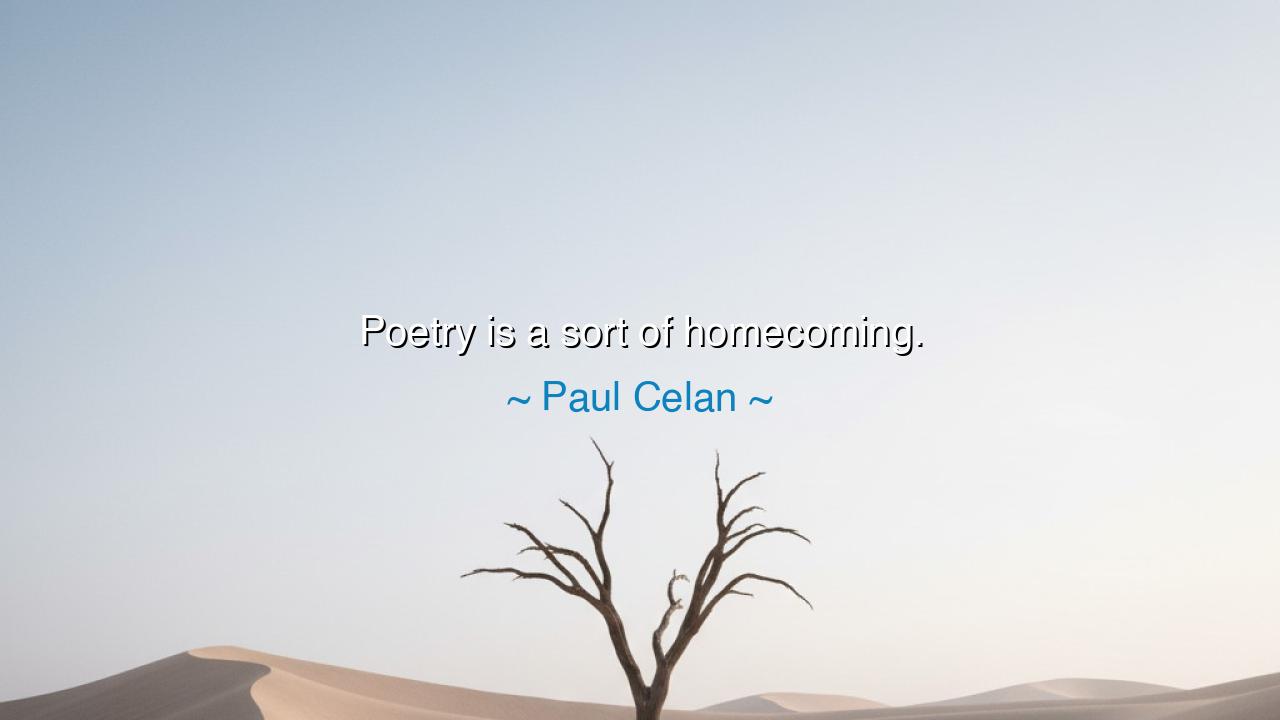
Poetry is a sort of homecoming.






The words of Paul Celan fall upon the heart like the sound of footsteps returning to familiar ground: “Poetry is a sort of homecoming.” In this utterance, Celan speaks not only as a poet, but as a survivor of exile, war, and unspeakable loss. His life, scarred by the Holocaust, was one of displacement and wandering, and for him the act of writing was more than art—it was a return to the self, a search for belonging in a world that had cast him adrift. Thus, he calls poetry a homecoming, for in it the soul finds refuge, identity, and truth.
From the ancients we know that all human beings yearn for homecoming. The Greeks gave us the word nostos, a return to home after long trial, embodied most powerfully in Homer’s Odyssey. Odysseus battled storms, monsters, and temptations, but the true aim of his journey was never conquest, but return—return to hearth, to wife, to the soil of his birth. In Celan’s words we hear the same yearning, though his Ithaca was not a place, but a space within language, a dwelling built from words when the physical world no longer offered sanctuary.
Poetry, for Celan, was more than ornamented speech. It was a lifeline. When language itself seemed corrupted by propaganda and violence, he reshaped it with care, carving truth out of silence. In verse he found a way back to meaning, and in that meaning, a way back to himself. This is why he calls it homecoming—because in writing, he reclaimed what the world had stripped from him: identity, dignity, memory, and the fragile spark of humanity.
History gives us many who discovered the same truth. Consider the enslaved peoples of countless ages, who, torn from their homelands, preserved their spirit through song and story. The spirituals sung by African Americans in the fields were more than music; they were homecomings, binding them to their ancestors, their God, and the hope of liberation. Though their bodies were in chains, their voices returned them to a truer home, a dwelling of the spirit. Just as with Celan, their art became a place to belong when the world denied them a place to stand.
To call poetry a homecoming is also to remind us that words can lead us back to ourselves when we have wandered far. Many live estranged from their own hearts, lost in the noise of duty, ambition, or sorrow. But when we write—or when we read—we often feel a strange recognition, as though the lines were doors opening to rooms we once knew but had forgotten. The poem does not create a home anew; it reveals the home that was always waiting within us.
The lesson is clear: seek your home not only in places, but in expressions of truth. Do not dismiss art, verse, or reflection as luxuries, for they are the very ground upon which the soul returns to itself. Just as the warrior longs for rest, so too does the spirit long for the home that words can build. Poetry is not escape; it is return. It reminds us who we are, and who we have always been.
Practical actions follow: read poetry when you feel estranged from yourself; write when you feel uprooted, even if the words are broken fragments. Use language as a map to trace your way back home. Share verse with others, for in doing so you create not only your own homecoming, but also a dwelling where others may find rest. And above all, remember that home is not only a place in the world, but a space of truth within the heart, and that poetry, in all its forms, is the key that opens its door.






BCNguyen Bao Chau
Paul Celan’s statement about poetry as homecoming feels deeply emotional. Is poetry, then, a way to return to a place of comfort or safety, where we can express our deepest thoughts and feelings? How do poets use words to create this 'homecoming'? Can writing or reading poetry heal or restore parts of us that have been damaged or lost, allowing us to return to a more authentic version of ourselves?
PVBao Pham Van
I love the idea of poetry as a 'homecoming.' It suggests that, through poetry, we find a return to something personal and meaningful. Does that mean poetry serves as a refuge, a place to escape to when the world feels chaotic? Or is it more about reclaiming something we lost within ourselves, whether it's a feeling, a thought, or an experience that poetry helps us bring back to life?
Hhewluen
The idea that poetry is a homecoming brings to mind how, when we read or write poetry, we often feel a deep sense of connection to our past or to a truth we’ve always known. Is poetry a place where we reconnect with ourselves, our history, or our emotions? How does the act of writing or reading poetry allow us to find a sense of belonging or understanding in the world?
Ttrantuananh
Paul Celan’s description of poetry as a 'homecoming' really resonates with me. It suggests that poetry is a return to something fundamental and comforting, almost like a personal sanctuary. How much of poetry is about revisiting familiar feelings or emotions, and how much is about discovering something new? Could it be that, in writing or reading poetry, we find a part of ourselves that we’ve forgotten or lost over time?